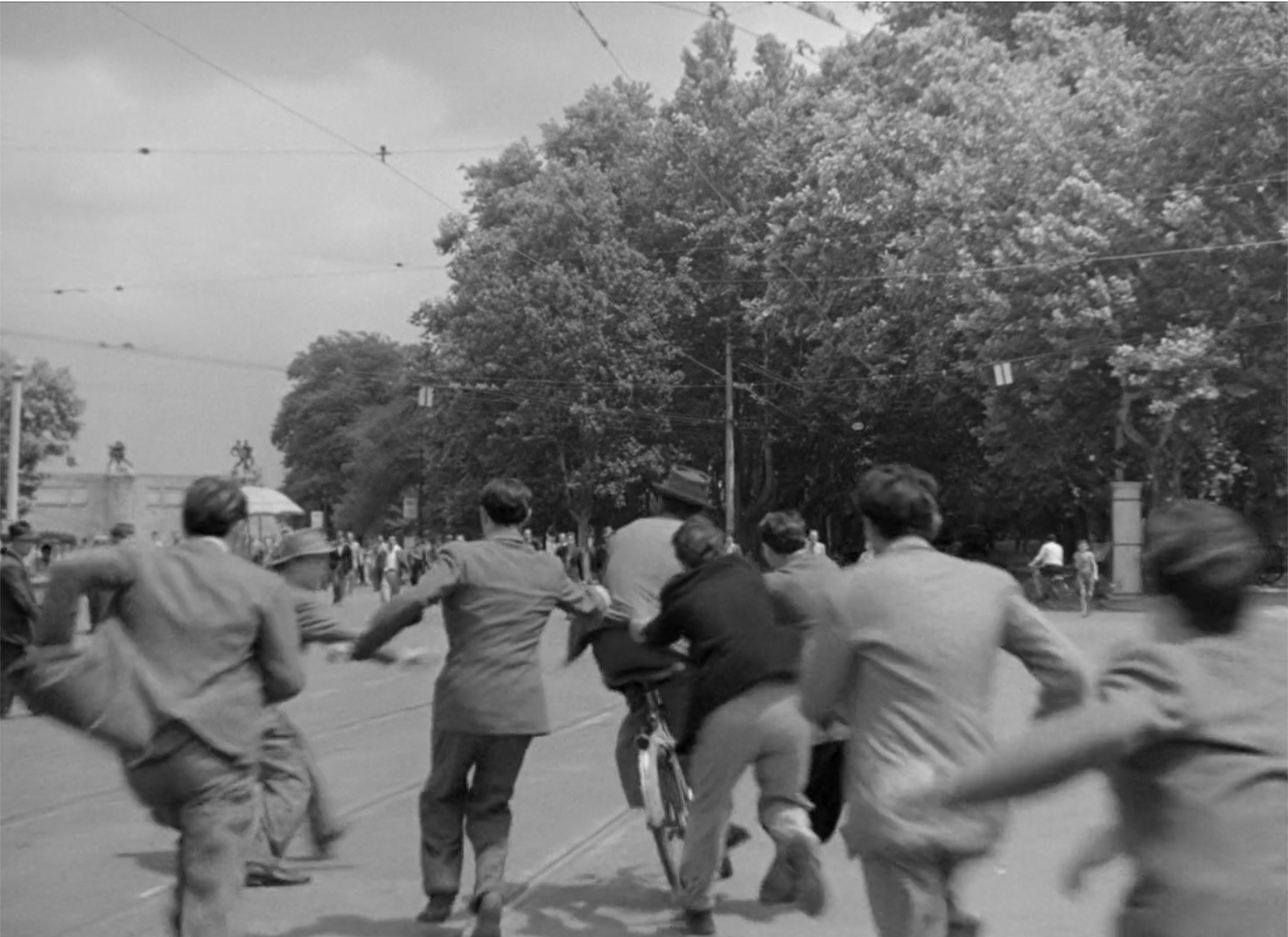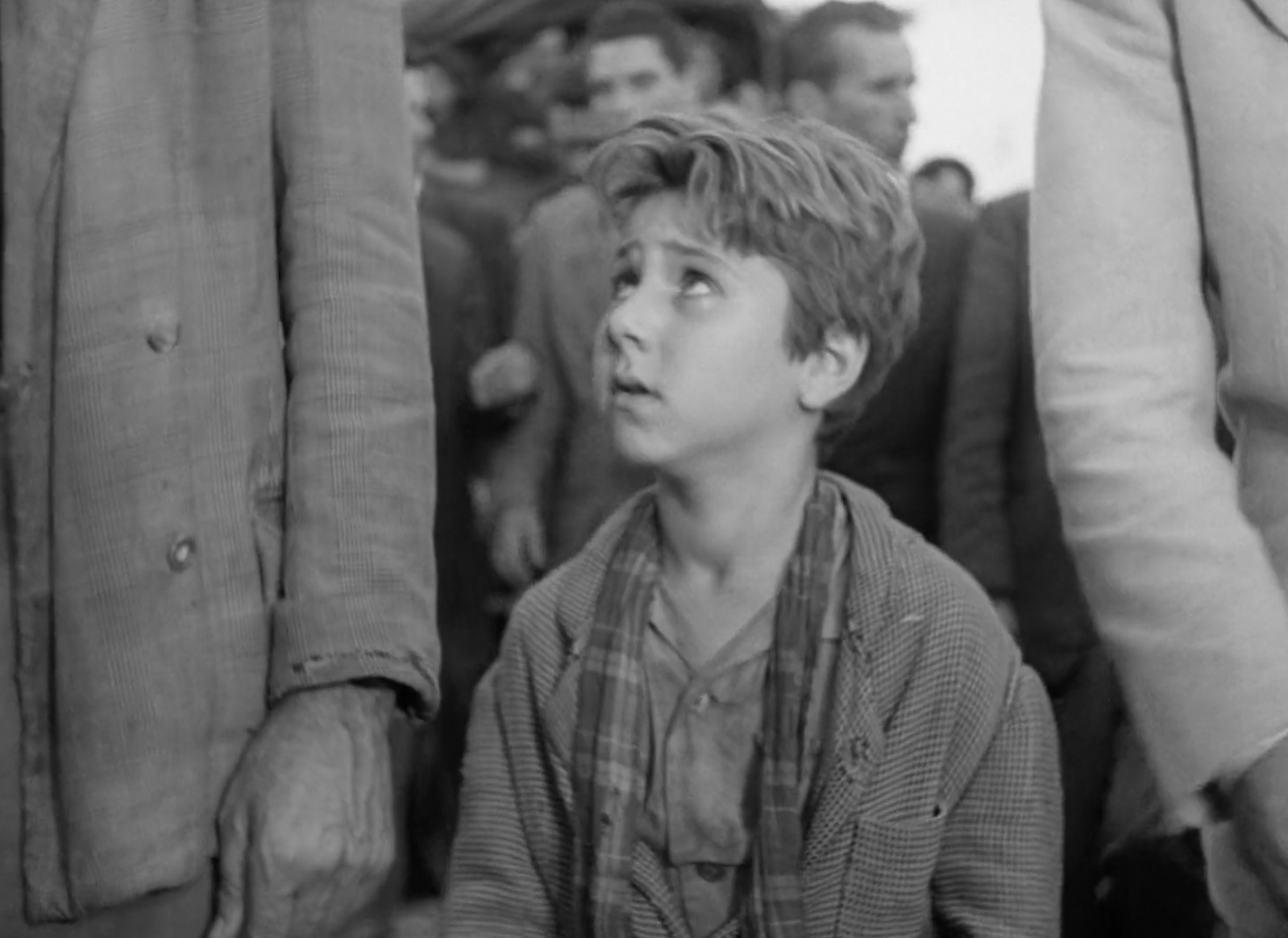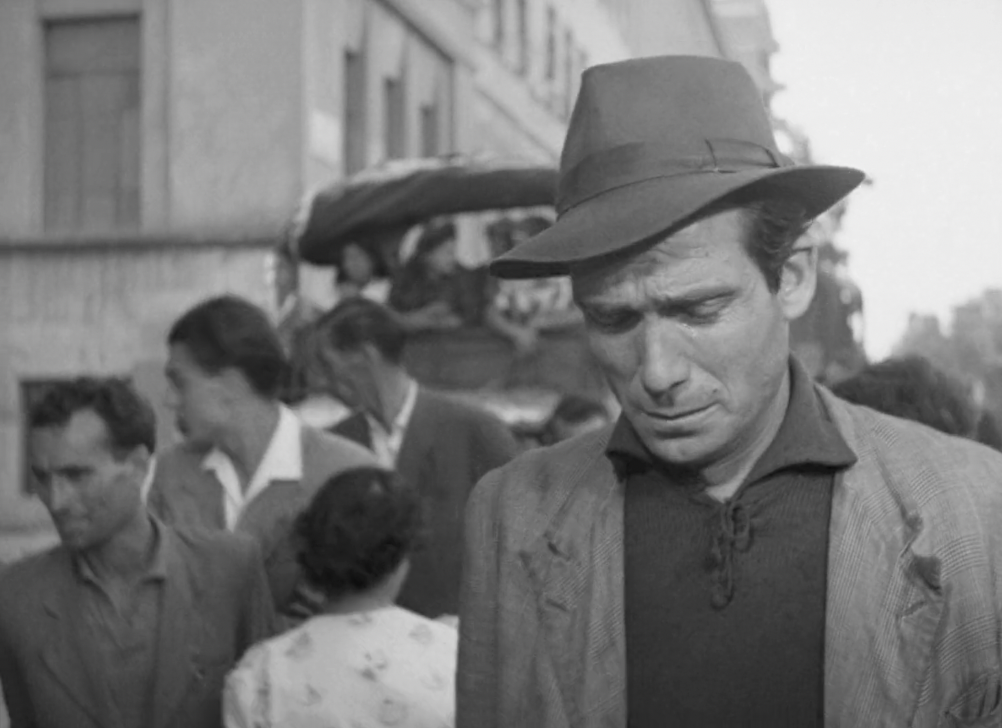Regia / Director: Vittorio De Sica, 1948
"Fermatelo! Al ladro!" Antonio continua a pedalare.
Sentendo il grido, altri uomini accorrono per aiutare.
“Stop him! Thief!” Antonio keeps pedaling.
Hearing the shout, men come running to help.
"Fermate quel tizio!" Il proprietario della bicicletta è agitato.
Un gruppo crescente di uomini insegue Antonio dietro l'angolo, urlando ai passanti di fermarlo.
“Stop that guy!” The owner of the bicycle is frantic.
A growing group of men chases Antonio around the corner, yelling for bystanders to stop him.
Antonio torna a correre sulla strada trafficata, schivando un tram, mentre altri passanti si uniscono al suo inseguimento. Bruno lo vede sfrecciare davanti a sé, sbalordito.
Antonio races back onto the busy street, dodging a tramcar, as more passersby join his pursuit. Bruno sees him speed past, stunned.
Antonio segue i binari del tram, in piedi sui pedali. Un campo lungo mostra l'ampia strada piena di inseguitori, mentre gli alberi maestosi rimangono indifferenti.
Antonio follows the tram tracks, standing on the pedals. A long shot shows the broad street filled with his pursuers, as the stately trees stand unconcerned.
Alla fine riescono a prendere Antonio, afferrandolo per il retro della giacca.
Finally they catch Antonio, grabbing the back of his jacket.
La bicicletta cade a terra mentre la folla circonda Antonio e lo spintona. Bruno osserva, con la sciarpa appesa al collo e la giacca malandata che gli cade dalle spalle.
The bicycle falls to the ground as the crowd surrounds Antonio, and pushes him. Bruno watches, scarf hanging around his neck, shabby jacket drooping off his shoulders.
In un turbine di movimenti, il proprietario della bicicletta arriva e colpisce Antonio con la mano, mentre Bruno corre verso la scena.
In a whirlwind of motion, the bicycle’s owner arrives and hits Antonio, while Bruno runs toward the scene.
"Mi volevi rovinare? Ho solo questa bicicletta!"
Bruno si stringe tra i corpi degli uomini e afferra la giacca di Antonio. "Papà! Papà!" singhiozza.
“Were you trying to ruin me? This bike is the only one I have!”
Bruno squeezes between the men’s bodies and grabs Antonio’s jacket. “Daddy! Daddy!” he sobs.
"Devi andare in prigione!"
"Papà! Papà!"
Qualcuno dà uno schiaffo in faccia ad Antonio.
"Sparisci, ragazzino!" Bruno si aggrappa.
“You should go to prison!”
“Daddy! Daddy!”
Someone slaps Antonio’s face.
“Beat it, little boy!” Bruno hangs on.
Quando arriva un tram, la folla si allontana dai binari, ancora aggrappata ad Antonio. A ogni finestrino del tram appare un volto, testimone della sua disgrazia.
When a tram arrives, the crowd moves off the tracks, still holding fast to Antonio. At every window of the tram, a face appears, witness to his disgrace.
Nella mischia, Antonio ha perso il suo cappello, che gli abbiamo visto mettere e togliere in ogni svolta della storia. Bruno si piega e lo raccoglie. Lo batte ripetutamente per scrollare la polvere mentre cammina verso il padre.
In the scuffle, Antonio has lost his hat, which we’ve watched him put on and off in each twist and turn of the story. Bruno bends and picks it up. He beats it repeatedly to shake off the dust as he walks to his father.
L'uomo che tiene il braccio di Antonio chiede: "A quale commissariato lo portiamo?"
Il proprietario della bicicletta risponde: "No! Alla questura!"* Poi si accorge di Bruno, che tiene in lacrime il cappello del padre.
*Nelle grandi città Italiane la polizia è presente nei commissariati che si trovano in molti quartieri, ma l’ufficio principale è la questura dove si possono anche presentare denunce.
The man holding Antonio's arm asks, “Which police station should we bring him to?”
The bicycle’s owner replies, “No! To headquarters!”* Then he notices Bruno, tearfully holding his father’s hat.
*In large Italian cities, police are present in “commissariati” located in many neighborhoods, but the main office is the “questura” where complaints can also be filed.
Guarda il ragazzo e poi il padre. "Lascia stare. Lascialo perdere!"
He looks at the boy, then at the father. “Forget it. Let him go!”
"E lo lascio qui?" chiede un uomo.
"Non voglio guai. Lascialo stare. Buongiorno a tutti e grazie". Mentre si allontana spingendo la bicicletta,
borbotta rivolto verso Antonio: "Bella roba insegni a tuo figlio! Dovresti vergognarti".
“I just leave him here?” a man asks.
“I don’t want trouble. Let him be. Have a good day, everyone, and thank you.” Walking the bicycle away, he mutters to Antonio, “Good stuff you teach your son! You should be ashamed.”
Bruno si asciuga gli occhi pieni di lacrime con un fazzoletto.
Il proprietario se n'è andato, ma gli uomini sono ancora insoddisfatti: “Vattene a casa che ti è andata bene!"
“Se fosse per me, andresti in prigione”.
Bruno wipes his tear-filled eyes with a handkerchief.
The owner has gone, but the men are still dissatisfied: “Go home, you were lucky!”
“If it were me, you’d go to prison.”
Uno del gruppo spinge via Antonio: "Vai a casa adesso. Fila!"
Antonio e Bruno si allontanano passando davanti a una fila di biciclette parcheggiate, le cui ruote creano un disegno di cerchi.
Una voce grida un'ultima provocazione: “Ringrazia Dio, vai! Smamma!” Ancora una volta, Antonio è un emarginato nella propria città.
One of the group pushes Antonio away: “Go home now. Beat it!”
Antonio and Bruno walk away past a line of parked bicycles, their wheels making a pattern of circles.
A voice calls out one last taunt: “You can thank God, go on! Scram!” Once again, Antonio is an outsider in his own city.
Bruno porge ad Antonio il suo cappello e i due camminano tra la folla indifferente, invisibili. Antonio si rimette il cappello in testa.
Bruno hands Antonio his hat and they walk among the indifferent crowd, invisible. Antonio sets his hat back on his head.
Bruno si asciuga le lacrime. Il chiacchiericcio concitato dei passanti contrasta con la cupa colonna sonora orchestrale.
Bruno wipes away his tears. The excited chattering of passersby contrasts with the somber orchestral soundtrack.
Padre e figlio sembrano sconvolti, ognuno nel proprio mondo.
Father and son seem shell-shocked, each in his own world.
Poi Antonio abbassa lo sguardo. Incontrando gli occhi imploranti di Bruno, inizia a singhiozzare.
Then Antonio glances down. Meeting Bruno’s imploring eyes, he begins to sob.
Bruno gli prende la mano e Antonio la stringe forte.
Bruno takes his hand, and Antonio grasps it tightly.
In Italian Neorealism: A Cultural History, Charles Leavitt IV discute il paradosso di Antonio. È visto come una figura poco importante da coloro a cui si rivolge per chiedere aiuto, solo un'altra faccia nella folla. La sua bicicletta è una delle tante; le sue lenzuola impegnate si aggiungono a scaffali già pieni di altre simili. Ma è anche ritratto come un uomo particolarmente offeso e ingiustamente ignorato. La sua bicicletta è essenziale per il benessere della sua famiglia; le sue lenzuola sono tesori della dote della moglie. In questo, naturalmente, non è il solo: innumerevoli altri sono stati costretti a impegnare i loro beni. De Sica presenta questo paradosso – Antonio come individuo e come membro tipico della sua classe – nel contesto dei problemi sociali ed economici dell'Italia del secondo dopoguerra.
In Italian Neorealism: A Cultural History, Charles Leavitt IV discusses the paradox of Antonio. He’s seen as an unimportant figure by those he approaches to ask for help, just another face in the crowd. His bicycle is one of many; his pawned sheets are added to shelves already filled with those much like them. But he’s also portrayed as a man particularly wronged and unjustly ignored. His bicycle is essential to the well-being of his family; his sheets are treasures of his wife’s dowry. In this, of course, he’s not alone: countless others have been forced to pawn their belongings. De Sica presents this paradox – Antonio as an individual and as a typical member of his class – within the context of Italy’s social and economic problems after World War II.
Alla fine, padre e figlio vengono inghiottiti dalla folla: l'orchestra suona un ultimo accordo. La storia di Antonio continuerà, con tutte le sue prove e tribolazioni, ma la macchina da presa è sparita. Non è più il protagonista, se non nel suo cuore tormentato.
At last, father and son are swallowed by the crowd: the orchestra plays a final chord. Antonio’s story will continue, with all its trials and tribulations, but the camera is gone. He is no longer the protagonist, except within his troubled heart.
FINE
This has been the final episode of this cineracconto. Subscribe to receive a weekly email newsletter with links to all our new posts.




























































